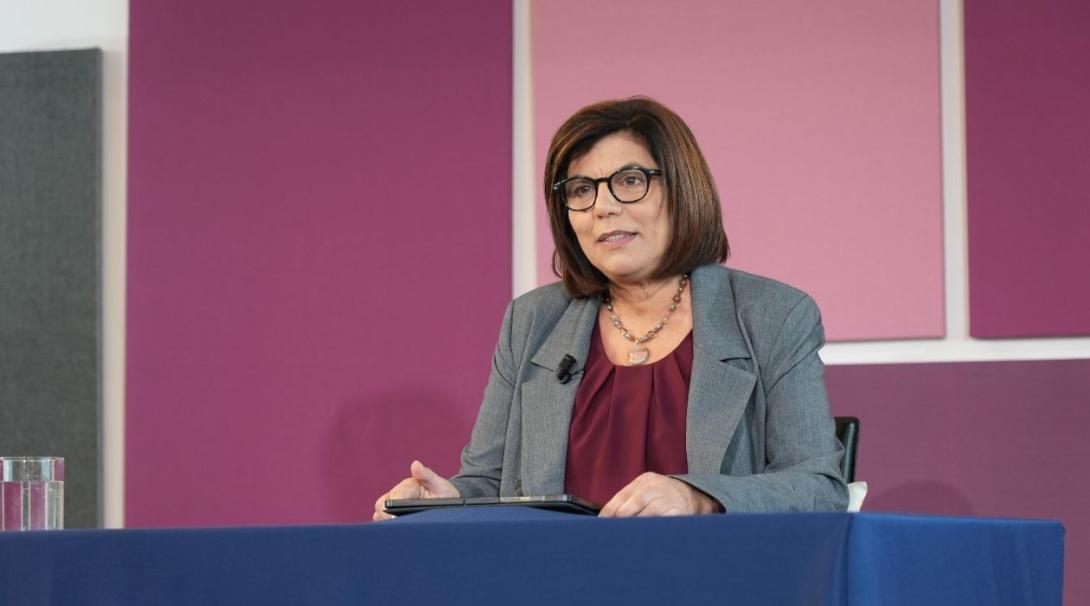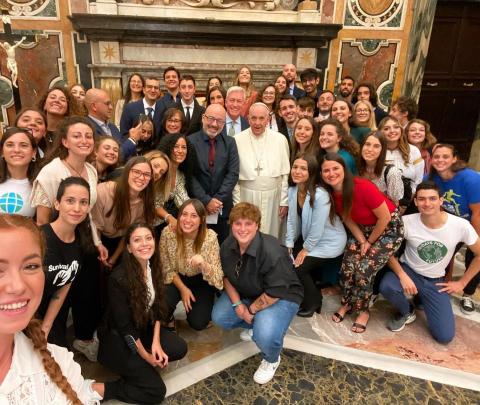An Interview with Margaret Karram, President of the Work of Mary (Focolare)

CSC Audiovisivi - Austin Im
Interview by Peter Forst for Neue Stadt magazine, Germany;
published here in English translation, with their permission.
Margaret, why did you choose “closeness” as the theme of the year for the Focolare Movement in 2025?
I asked myself what kind of world we live in. And it seems to me that at this moment in history there is so much loneliness and so much indifference. And then there is an escalation of violence, of wars that bring so much pain all over the world. Also, I’ve been thinking about the technology that has connected us in ways we never knew before, but at the same time it makes us more and more individualistic. In a world like this, I think closeness can be an antidote; an aid to overcoming these obstacles and curing these “ills” that make us distant from one another.
Where can we start?
I have been asking myself this question for months. It seems to me that we need to re-learn how to approach people, re-learn how to look at and treat everyone as brothers and sisters. I felt that, first of all, I had to do an examination of my own attitude. Are the people I approach every day brothers, are they sisters to me? Or am I indifferent toward them or even consider them enemies? I asked myself many questions. I have found that sometimes I want to avoid a person, because maybe they will bother me or annoy me or want to say difficult things to me. Because of all this, I titled my reflection on closeness that I presented in mid-November to the leadership of the Focolare Movement, “Who are you to me?”
Could you tell us some of the main ideas you developed under this title?
Gladly. I mention four thoughts. The first, closeness that our soul experiences is to contact with God. He himself connects with our neighbors also through us. The desire to love the other is an inner movement from God in me directed to God in the other.
A second thought: Closeness is dynamic. It calls for complete openness, that is, welcoming people without reservation; entering into their way of seeing things. We are not mass-produced! Each of us is unique, with a different character, mindset, culture, life and history. Recognizing and respecting this, calls for stepping out of our mental and personal patterns.
You were talking about a third aspect ...
Yes. The third aspect I want to emphasize is that closeness does not necessarily coincide with being close by, with being similar, with belonging to the same culture. The parable of the Good Samaritan (Luke 10:25-37) expresses this very well. I was struck by the attitude of the Samaritan: The man who had fallen among the robbers was a person unknown to him, he was even from another people. He was a distant person both in culture and tradition. However, the Samaritan made himself a neighbor. This is the key point for me. Everyone has his own dignity, above and beyond the people and culture he comes from, or his character. The Samaritan did not approach just to see if this person was hurt and then turn away or, if anything, call for help. He made himself a neighbor and healed the person. The fourth aspect ...
Would be ...
Let us be wounded. If closeness is to bear fruit, each of us must not be afraid and must allow ourselves to be wounded by the other.
And that means: allowing ourselves to be challenged, exposing ourselves to questions to which we have no answers; being willing to show ourselves vulnerable; presenting ourselves as perhaps weak and incapable. The effect of such an attitude can be surprising. Just think that a nine-year-old boy wrote me that for him closeness means “lifting up the other person's heart.” Is this not a wonderful effect of closeness? Lifting up the heart of the other.
If we really live it well so many things will change. I wish, hope, and pray that it will.
What would change within the Focolare Movement if we live closeness well?
If we really live it well so many things will change. I wish, hope, and pray that it will. But I also want to point out that so many in the Focolare Movement already live closeness. How many initiatives there are, how many projects for peace and for helping the poor. We have even opened focolares to give assistance and welcome to immigrants or to care for nature.
And what should change?
The quality of relationships between people. Sometimes it is easier to treat people outside the Movement well and more difficult among us who are part of the same family. We are in danger of living “good manners” relationships with each other: We do not hurt each other; however, I wonder, is this an authentic relationship?
So, I hope that, beyond projects, closeness becomes a daily way of life; that we ask ourselves several times during the day: Am I living this closeness? How am I living it? An important expression of closeness is forgiveness. To be merciful to others—and to ourselves.
What message does it contain for society?
Closeness is not only a religious or spiritual attitude, but also a civil and social one. It is possible to live it in any sphere of life. In education for example or medicine, even in politics, where it is perhaps more difficult. If we live it well, we can have a positive influence on relationships where we are.
What about the Church?
The church exists because, with the coming of Jesus, God became a neighbor. The Church, the Churches then, are called to witness a lived closeness. Recently the Catholic Church experienced the Synod. I was able to attend the two sessions at the Vatican. We were more than 300 people, each from a different culture. What did we do? An exercise in synodality, an exercise in listening, in deep knowledge, in welcoming the other's thinking, their challenges and pains. These are all characteristics of closeness.
The title of the synod was “Walking Together.” This walking involved so many people all over the world. The logo of the synod expressed the desire to widen the tent of the Church so that no one feels excluded. It seems to me that this is the true sense of closeness, that no one is excluded; that everyone feels welcomed, whether it is those who attend the church, those who do not recognize themselves in it, or those who have even drifted away for various reasons.
I would like to mention for a moment the limits of closeness. How to live it well?
This is an important question. Are there limits to closeness? As a first answer I would say there should be no limits.
However?
We cannot be sure that what is closeness and solidarity for us, or what is closeness for me, is closeness and solidarity for the other. And in a relationship we can never lack respect for each other's freedom and conscience. These two things are essential in any relationship. That is why it is important that when we approach a person, it is always done gently, and not as something imposed. It is the other person who decides how much and what kind of closeness he or she wants.
There is learning to be done, isn’t there?
Absolutely. We have made quite a few mistakes. In thinking we love the other person, we have hurt them. In the rush to communicate our spirituality, we have built relationships in which the other has not always felt free. Sometimes it seems to me that with the good intention of loving a person, we crushed them. We did not have enough delicacy and respect for the other’s conscience, the other’s freedom, the other’s time. And this has led to certain forms of paternalism and even abuse.
Certainly it is a very painful situation that we are facing, and where the victims have a unique, really unique importance. Because on our own we cannot sufficiently understand what has happened. It is the victims who help us understand the mistakes we have made and take the necessary steps so that these things don't happen again.
A final wish?
I hope that this theme can bring us back to the essence of what Jesus himself gave us in the Gospel. He gave us so many examples of what it means to live closeness.
There is a thought of Chiara Lubich that resonated very strongly with me in thinking about this theme. She says, “There are those who do things ‘out of love,’ there are those who do things trying to ‘be Love.’ Love appropriates us in God, and God is Love. But the Love that is God, is light, and with light we can see whether our way of approaching and serving our brother is in accordance with the Heart of God, as our brother would desire it, as he would dream if he had not us next to him, but Jesus.”
Thank you from the bottom of my heart, Margaret, for your passion for a closeness lived with decision and respect.













